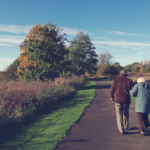As your elderly loved ones age they inevitably lose lifetime friends and close family members, which can leave them feeling both bereft and isolated.
Isolation and loneliness in older people are growing problems in the UK. The number of people living longer is increasing and so is the time that they are spending alone. Isolation and loneliness can affect everyone, but older people are more vulnerable as they face difficult life events that typically occur in later life.
Recent research shows that loneliness is a serious risk factor that has an impact on physical health.
A new survey by the Associated Retirement Community Operators (ARCO), indicates loneliness is a growing epidemic in Britain.
- Individuals over the age of 65 are spending more than 66 million hours alone
- Each person over 65 spends more than 100 days alone each year
- Loneliness is considered to be a “hidden killer” resulting in a 10% increased risk of death in older people
- 24% of people over 65, feel lonely some or most of the time
- 1 in 5 people over the age of 75 may not speak or see another person for an entire weekend
- Over 50% of participants in the study admitted that they did not feel comfortable to talk about their loneliness with family
- London was found to be the loneliest area to grow old, with 7.8 hours being the average time spent alone in one day
The ARCO survey also reveals that older individuals are not necessarily concerned about moving out of family homes but are more worried about their healthcare management as they get older. Moreover, ARCO have used these survey results to lobby retirement communities that provide housing, so that they can better address isolation and loneliness in older people.
ARCO chairman Jon Gooding said:
We are in the grip of a loneliness epidemic. People are fearful of their declining health, and yet appear to be unprepared for old age. Couple this with the fact that in 2033 there will be 3.3 million people over the age of 85 in the UK and it becomes clear that we face a momentous challenge. The emergence of this brand new generation, who want more and expect more from their retirement, calls for an entirely different approach to housing and care. We need to wake up as a country and ensure that people are aware of, and have access to, a variety of options for high quality housing, care and support in old age.
Now is the time for the Government to support growth in the housing care sector, helping older people make the right move at the right time, having access to the support they need whilst maintaining their right to their own front door.
Linking loneliness and health:
Loneliness has been associated with a wide range of negative effects on the health and well being of elderly people. Some of the health risks associated with loneliness include:
- Depression and suicide
- Dementia due to decreased memory and learning
- Cardiovascular disease and stroke
- Increased stress levels
- Antisocial behavior
- Alcoholism and drug abuse
- Poor life expectancy
The association between social isolation, feelings of loneliness and incident of dementia in non-dementia seniors were assessed in a study published by the Journal of Neurology, Neurology, Neurosurgery and Psychiatry, (BMJ, 2012). Findings suggest that older individuals who feel lonely are more likely to develop dementia. Loneliness is also suggested to be a key risk factor that is comparable to smoking and is linked with early mortality rates (Holwerda et al, 2012). It is clear that clinical attention is required to better understand this risk factor and to improve outcomes for those susceptible to developing dementia.
Why do older people become lonely?
Socially isolated individuals typically feel lonely, but loneliness is not synonymous with being socially isolated. Loneliness is more correctly defined as the disturbing or worrying feeling that accompanies inconsistencies between an individuals’ desired and actual social relationships (Peplau & Perlman, 1982).
It is also important to note that isolation and loneliness are not entirely effects of the ageing process, but result from difficult life events that occur in later life.
What leads to loneliness?
Issues that put older people at risk of loneliness include:
- Retirement
- Living alone
- Health decline and becoming dependent on care
- Bereavement
- Lack of support from friends or families
- Lack of general opportunities to pursue hobbies and activities
- Environmental factors, e.g. inaccessible design of public areas and transport to facilitate mobility issues
- Insufficient income or poor living conditions
- Lack of access to information, appropriate care or learning facilities
- Fear of discrimination, crime and safety
- Literacy issues
How can we combat loneliness in older people?
Social isolation and loneliness in the elderly are complicated issues and therefore have complex solutions. This is an issue that often goes unnoticed and as a result, is overlooked by the public. It is crucial for this growing matter to be taken seriously by national policy-makers.
What can be done:
Improvements to local environment: making public areas or transport easier to access for older people with mobility issues, which will encourage them to partake in activities outside their homes.
Increase public awareness Joining and participating in campaigns targeted to reduce loneliness in the elderly is a good way to engage with the public and promote the cause. Volunteers can also contact local editors and healthcare boards to notify them about this issue. The Campaign to End Loneliness is a UK based coalition of organisations and individuals who work together through research, policy, campaigning and innovation to prevent loneliness in the elderly.
Be-friending services: Age UK has developed befriending services that assigns an older person to a ‘befriender’ who provides friendly interaction and conversation. This companionship not only encourages wellbeing and confidence but also allows older people to live in their homes independently for longer.
5 Ways carers can help their elderly loved ones combat loneliness:
- Listen: Encourage your older relatives to express themselves. This is a great way to discover their problems or passions.
- Strategize: Discovering information about your elderly relatives is an opportunity to develop a strategy that will help mend their problems, re-kindle their interests or cultivate new hobbies.
- Learn: One way to connect with older loved ones is to learn from them and allow them to pass on their words of wisdom.
- Combine: Get the youngest and oldest generations in your family to connect. This will reduce the feeling of loneliness in your elderly loved ones and stimulate mental activity through social interaction. A fun bonding activity might be getting grandchildren to teach their grandparents how to use the computer.
- Think: Little gestures that show that you are thinking about your elderly relatives can be a good way to make them feel less isolated. Giving them a quick phone call or updating them with pictures can have a great impact.
How hometouch can help:
Some older people have admitted that they are not interested in accessing public services as they lacked the interest or confidence to participate in group activities. Others confessed that they did not want to become a burden on society or feel as if they are receiving charity. Care services need to recognize these issues and consider individual needs.
References:
- https://www.ageuk.org.uk/health-wellbeing/relationships-and-family/befriending-services-combating-loneliness/
- https://www.agingcare.com/Articles/loneliness-in-the-elderly-151549.htm
- https://www.ncbi.nlm.nih.gov/pmc/articles/PMC3016701/
- https://news.bbc.co.uk/1/hi/uk/7701115.stm
- https://www.guardian.co.uk/society/2013/feb/26/older-people-new-mindset-combat-loneliness
- https://www.umlnews.net/ideas-to-combat-loneliness-and-isolation-common-in-elderly-individuals/
- https://www.ageuk.org.uk/our-impact/policy-research/loneliness-research-and-resources/




